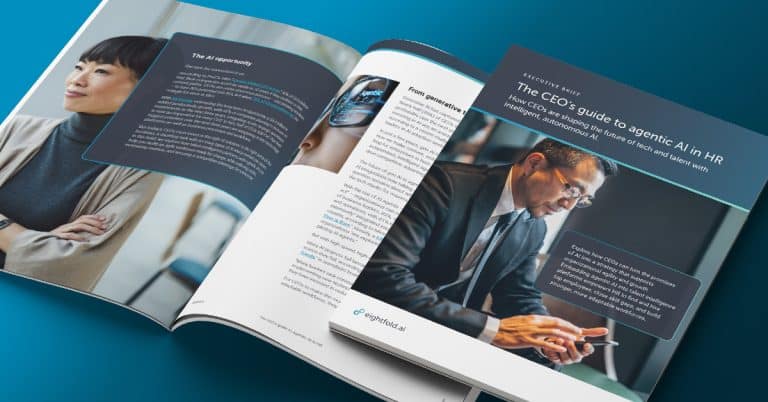
The CEO’s guide to agentic AI in HR
The CEO’s guide to agentic AI in HR
CEOs are under enormous pressure to turn AI’s potential into tangible ROI. The stakes for adopting agentic AI are high — and the margin for error is slim. It’s why you must invest in the right AI solutions now to drive real results in the near future.
In this executive brief, you’ll quickly learn why HR is the ideal area of your workforce to start integrating agentic AI into the tech stack. With real-time data on skills, talent intelligence combined with agentic AI quickly surfaces and moves the right talent along to support your overall business goals.
In this brief, you’ll learn:
- The potential of agentic AI to boost ROI and drive real results.
- How agentic AI saves time and resources, so people can focus on higher value work.
- Why now is the time to research and invest in agentic AI technologies.
The AI opportunity
The race for reinvention is on.
According to PwC’s 28th “Annual Global CEO Survey,” 40% of CEOs believe that their companies won’t be viable in 10 years if they continue on their current paths. CEOs are under enormous pressure — and shrinking timelines — to turn AI’s potential into ROI, but when 70% of transformations fail, the margin for error is slim.
With McKinsey estimating the long-term AI opportunity at $4.4 trillion in added productivity growth, with 92% of companies planning to increase AI investments in the next three years, integrating AI into strategic operations is now an imperative for every CEO. In fact, half of CEOs told PwC that their biggest priorities over the next three years are integrating AI into technology platforms as well as business processes and workflows.
But today’s CEOs must invest in the right AI solutions in the right areas of the business, a daunting task with so many types of AI and potential use cases. In this brief, we explore how talent intelligence platforms with agentic AI can help you build an agile workforce ready for change, while reducing costs, increasing revenue, and securing a competitive advantage for tomorrow.
From generative to agentic AI
Generative AI has captured the attention of nearly every business leader. Nearly half (49%) of CEOs told PwC that they expect gen AI to increase profitability over the next year — and for good reason. Organizations investing in AI see an average return of $3.7 for every dollar invested, according to a recent study from IDC and Microsoft, with the top 5% of leaders in AI adoption seeing even higher returns of around $10.
In just a few years, gen AI has transformed how we work, including how we make content, write code, and automate tasks. Now, the next leap for enterprises is here — a shift from reactive, prompted tools to independent, intelligent agents that boost productivity, reduce costs, and drive competitive advantage.
The future of gen AI is agentic AI, with the race for CEOs to adopt agentic AI integrations now taking center stage for many leaders. But the big question remains about where CEOs should focus first with agentic AI in the tech stacks for maximum impact in a short time.
With the rise of AI agents — digital workers that can “reason, plan, and act” — organizations can now scale workforces as needed. The majority of business leaders, 82%, say this is a “pivotal” year to rethink strategy and operations, with 81% expecting agentic AI to be “moderately or extensively” integrated into their AI strategies in the coming 12-18 months, according to Microsoft’s report, “2025: The Year the Frontier Firm is Born.” Already, a KPMG Pulse Survey states that over half of organizations “are exploring the use of AI agents, and 65% are piloting AI agents.”
But with high-speed, high-stakes transformations, there’s always risk.
Many AI projects fail because organizations lack the right skills. Another reason they fail, according to Deloitte’s “2025 Global Human Capital Trends,” is unrealistic business use cases. The result?
Many leaders sink considerable time and capital into buying and implementing new technologies, only to change direction later or realize they have invested in redundant technologies.
For CEOs to make the most of their AI investments and build an agile, adaptable workforce, they must invest strategically.
You might also like...
Get the latest talent news in your inbox every month
By submitting this form, I consent to Eightfold processing my personal data in accordance with its Privacy Notice and agree to receive marketing emails from Eightfold about its products and events. I acknowledge that I can unsubscribe or update my preferences at any time.
